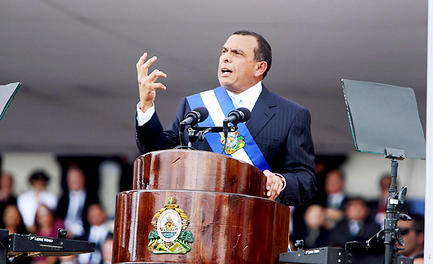Honduras: new President takes office
 Porfirio Lobo was sworn in as the new President of Honduras, putting an end to six month of political crisis, after Manuel Zelaya was deposed by a coup d’état last July.
Porfirio Lobo was sworn in as the new President of Honduras, putting an end to six month of political crisis, after Manuel Zelaya was deposed by a coup d’état last July.
Lobo, who won the elections last November, will have to make reconciliation a priority, in one of the poorest countries in Latin America.
One hour after Lobo took oath of office in the national stadium, Zelaya left his shelter in the Brazilian Embassy in Tegucigalpa to travel to the Dominican Republic as a “guest of honour”. Thousands of followers of the deposed president gathered in the international airport to say goodbye to their leader. Zelaya went into exile accompanied by Dominican President Leonel Fernandez.
The Honduran parliament approved unanimously an amnesty to allow Zelaya to leave the country. Porfirio Lobo had made it clear that it would have been counterproductive to be sworn in while a deposed president was “in prison”.
La Tribuna (Honduras, Spanish)
http://www.latribuna.hn/web2.0/
El Heraldo (Honduras, Spanish)
http://www.elheraldo.hn/
El Pais (Spanish)
http://www.elpais.com/articulo/internacional/Porfirio/Lobo/afronta/reconciliacion/Honduras/elpepuintlat/20100127elpepuint_10/Tes
Peru: Five people die from rains in Cuzco
.jpg) The intensive rains that has been affected the Peruvian city of Cuzco has left a death toll of five people, while hundreds of towns remain isolated because of the landslides that have destroyed many roads. A tourist and a travel guide died when trying to reach the Inca citadel of Machu Picchu.
The intensive rains that has been affected the Peruvian city of Cuzco has left a death toll of five people, while hundreds of towns remain isolated because of the landslides that have destroyed many roads. A tourist and a travel guide died when trying to reach the Inca citadel of Machu Picchu.
The Peruvian government has put in place an operation to rescue thousands of tourists trapped in Machu Picchu and those who are still waiting to be airlifted are running out of water and food. The railway that leads to the ruins was destroyed by landslides.
Tension has been growing among the tourists that remain in Aguas Calientes, a town on the slopes of Machu Picchu, with accusations being made that some US visitors have been paying helicopter pilots to give them priority in the rescue. The government says that nobody is paying to be flown out.
El Pais
http://www.elpais.com/articulo/internacional/Crece/tension/cientos/turistas/atrapados/Machu/Picchu/elpepuintlat/20100127elpepuint_17/Tes
El Comercio (Peru, Spanish)
http://elcomercio.pe/noticia/405586/cinco-muertos-vienen-dejando-lluvias-cusco
Haiti: another survivor rescued
 A young girl was rescued by a French team in the Haitian capital, Port-au-Prince, five days after the government put an end to the search for survivors.
A young girl was rescued by a French team in the Haitian capital, Port-au-Prince, five days after the government put an end to the search for survivors.
She was found under the remains of a university building that collapsed after the earthquake that destroyed much of the Haitian capital.
In the meantime, the UN is coordinating a temporary integration of Dominican troops into the Haitian army, in order to start the reconstruction of the country. Brazilian general Floriano Peixoto, the head of the UN peacekeeping troops, hasarrived in Santo Domingo to discuss the deployment of Dominican soldiers with the government.
Listin Digital (Dominican Republic, Spanish)
http://www.listin.com.do/app/article.aspx?id=129583
BBC News
http://news.bbc.co.uk/1/hi/world/americas/8484317.stm
ECONOMY
Mexico to buy dollars to boost reserves
The Mexican government is planning to by millions of US dollars on the money market, to boost its monetary reserves. Mexico wants to stop depending on a credit line of US$47 billion granted by the International Monetary Fund.
Agustin Carstens the governor of the Mexican Central Bank said that “we want to do it through a mechanism that is based on certain rules so that when certain conditions occur in the market, the purchases are made.”
Mexico’s monetary reserves are the lowest among the major economies in Latin America.
Bloomberg
http://www.bloomberg.com/apps/news?pid=20601086&sid=arS7hPxezsYI
ENVIRONMENT
Indigenous peoples worry for climate change
.jpg) Indigenous delegations of 14 Latin American countries have held a meeting in the Peruvian capital, Lima, to discuss climate change. They concluded that indigenous communities must improve their efforts to have their voice heard during the UN summit on climate change (COP16) that will take place in Mexico in December.
Indigenous delegations of 14 Latin American countries have held a meeting in the Peruvian capital, Lima, to discuss climate change. They concluded that indigenous communities must improve their efforts to have their voice heard during the UN summit on climate change (COP16) that will take place in Mexico in December.
The Second Latin American Conference on Climate Change and its Impact on Indigenous Peoples published a final communiqué denouncing the serious effects that climate change has on indigenous communities, with extreme weather conditions and the emergence of illnesses that never before affected the Andean highlands, like dengue and malaria.
The conference underlined the fact that food security is in crisis as a result of the destruction of foodstuff crops. They are asking the UN to create a “Mother Earth Day” to highlight the plea of rural communities who are suffering the consequences of climate change.
Inter Press Service (Spanish)
Photo credits
El Heraldo (Honduras)
US Department of Defense

